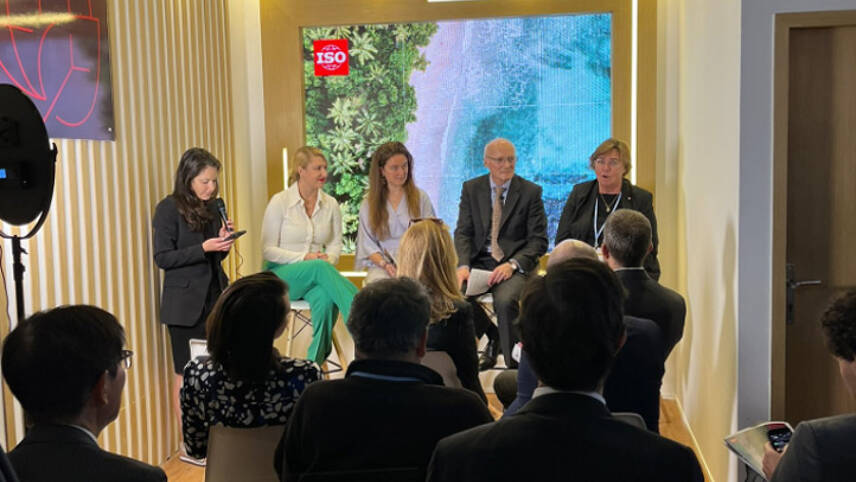Register for free and continue reading
Join our growing army of changemakers and get unlimited access to our premium content

Pictured: The launch event at COP27 for the new standards. Image: ISO
The ‘Net-Zero Guidelines’ have been published this morning (11 November) to coincide with the decarbonisation-themed day on the COP27 Presidency Agenda. The ISO has revealed that the resource took three months to create and takes in the recommendations of 1,200 experts across the world.
The ISO has stated that the guidelines can be used by “all actors and organisations” of all sizes, in the public and private sectors. It is an influential platform and its previous resources are being used in some of the world’s highest-emission sectors and corporates. The ISO’a president Ulrika Francke has said that the body “is determined to increase positive impact worldwide” amd “ensure [the guidelines] are used with the broadest possible reach.”
The ISO is calling the Guidelines a “single core reference text” for any organisation wishing to credibly use terminology relating to net-zero emissions and create meaningful targets. They are available for free to anyone who first registers their email address.
Francke added: “The Net Zero Guidelines will bring much-needed alignment on net zero… This publication is a historic milestone in bringing the international community closer to delivering on climate commitments and set the world on the right path for 2050.” The UN stated last month that the world is on track for at least 2.5C of warming on pre-industrial temperatures by the end of the century, compared with the Paris Agreement’s 2C and 1.5C goals.
The guidelines have been welcomed by the UN’s climate change body, the UNFCCC, and also by the UN’s High-Level Champions on Climate Change. Champion Nigel Topping said the new guidelines “helpfully build on the Race to Zero voluntary criteria and can be used as a core reference text on net zero to bring global actors into alignment, ratchet up ambition and address greenwashing.”
Earlier this year, the Race to Zero, which is backed by almost 4,000 non-state actors, updated its minimum membership standards in a bid to stop organisations involved in fossil fuel financing and lobbying from greenwashing. The Glasgow Financial Alliance for Net-Zero, covering $150trn of assets, subsequently cut ties with the initiative.
Cracking down on greenwashing relating to net-zero has been a key focus of side events at COP27. Earlier this week, the UN-convened High Level Expert Group on Net Zero Emissions Commitments of Non-State Entities published its first set of recommendations for net-zero target development by non-state actors. This UN term covers all organisations which are not nations or states, such as cities and businesses. This report highlights the importance of reducing emissions as a priority, rather than over-relying on offsets.
Elsewhere, the UK’s Transition Plan Taskforce has published its first proposals for guidelines on what corporate net-zero transition plans should include in order for them to be classed as ‘gold standard’. Large firms in high-emission sectors in the UK will be mandated to produce such plans in the coming months and some have already produced them voluntarily.
Net-Zero Playbook
In related news, influential industry body the Consumer Goods Forum has worked with digital professional services firm Accenture to launch a new Net-Zero Playbook for companies operating in the consumer goods industry.
The aim of the resource is to provide these companies with best-practice advice on developing and delivering against net-zero goals. It is hoped that it will be valuable, in particular, to companies that are in the earlier stages of their net-zero journey.
The report emphasizes the value-creation opportunities of going further and faster on sustainability, including new innovation opportunities, reducing spend on energy and materials and improving resiliency.
It highlights the importance of engaging with suppliers on decarbonisation as a priority, given that most consumer goods firms will see most of their emissions footprint falling within the supply chain. Engagement themes covered in the Playbook are sustainable agriculture, plastics and packaging and transport and logistics. Additionally, there is a section dedicated to emissions arising from the consumer use and disposal of products and packaging. The report outlines how long key initiatives in these areas are likely to take, their complexity, and the level of investment they require.


Please login or Register to leave a comment.